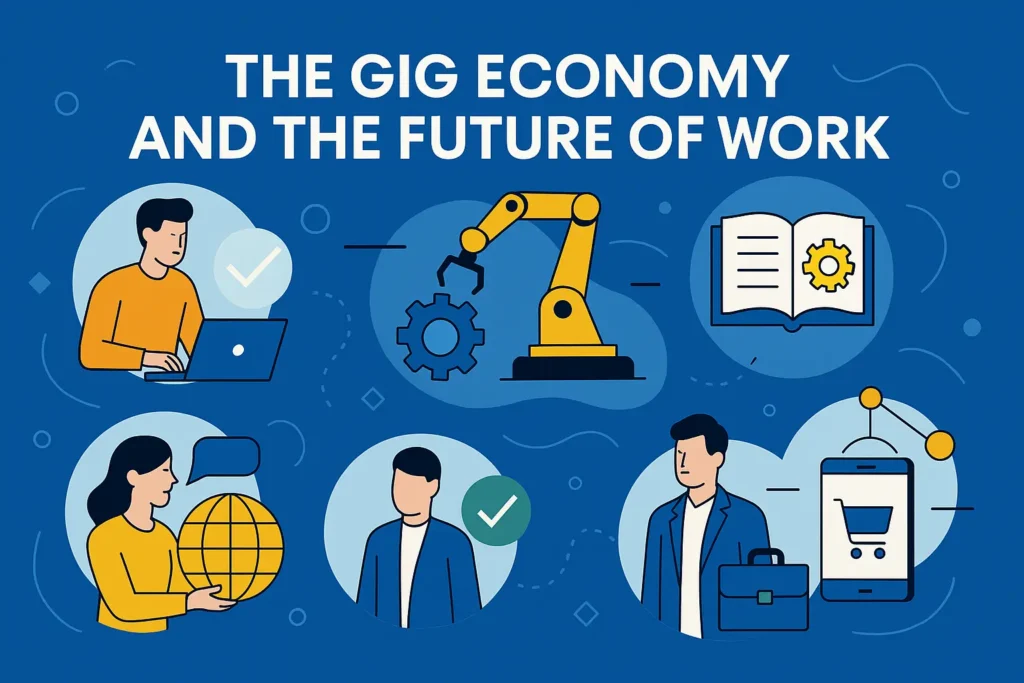The gig economy is no longer a fringe trend it’s central to the future of work. As companies and workers alike seek agility, control, and new ways to add value, independent, on‑demand roles are soaring. Recent data shows that over one‑third of U.S. professionals now participate in gig work, and by 2027, half of developed‑world workers will operate outside traditional employment models (Upwork). Below, we explore the seven pillars shaping the future of work in the gig era.
1. Rise of Remote Work: Flexibility Shaping the Future of Work and Gig Opportunities
Remote roles exploded during the pandemic, and they’re here to stay. In 2025, 58% of freelancers cite location‑independence as their top motivator up from 42% in 2020. This geographic freedom empowers businesses to tap talent worldwide, driving the future of work toward a truly distributed model. Companies offering remote gig roles report 30% faster project turnaround times, as workers can align tasks with their peak productivity hours.
2. AI and Automation in the Future of Work: Transforming Gig Roles and Skills Demand
Artificial intelligence is redefining which tasks can be outsourced to gig workers and which can’t. Eighty‑six percent of employers expect AI to reshape their operations by 2030, with gig platforms integrating machine‑learning matchmaking to boost efficiency and quality. As routine tasks get automated, gigs requiring creativity, emotional intelligence, and strategic thinking surge. Upskilled freelancers in data analysis, UX design, and AI oversight are among the fastest‑growing segments in the future of work landscape.
3. Upskilling and Reskilling for the Future of Work in the Evolving Gig Economy
In a world where platforms can pivot overnight, continuous learning is the linchpin of gig success. A recent survey found that 72% of gig workers invest in online courses annually double the rate of traditional employees. From cybersecurity certifications to no‑code development bootcamps, targeted upskilling ensures freelancers remain indispensable. This trend cements lifelong learning as a core pillar of the future of work, where adaptability equals earning power.
4. Regulatory Changes and Worker Protections: Securing the Future of Work in Gig Labor
As the gig sector booms, governments are racing to balance flexibility with fairness. India’s FY25 gig market grew 38%, prompting states like Rajasthan to pass platform‑worker welfare bills guaranteeing basic benefits and grievance mechanisms (The Economic Times). In the EU, the new Platform Work Directive seeks to classify certain freelancers as employees to ensure minimum wages and social security. Clear regulations will underpin a sustainable future of work that safeguards independent talent.
5. Globalization of Gig Opportunities: A Borderless Future of Work Marketplace
Borderless marketplaces now host millions of projects daily. Platforms report that 60% of jobs are posted by clients outside a freelancer’s home country, fostering cross‑cultural collaboration and competitive pricing (Upwork). This global reach not only widens opportunity for gig workers but also accelerates skill transfer across markets. As localization tools improve, the future of work will be defined by seamless, international gig exchanges.
6. Hybrid Work Models: Merging Traditional Roles with the Future of Work in Gigs
Many organizations blend full‑time staff with gig talent to optimize cost and innovation. A 2024 study found that 45% of enterprises employ hybrid teams permanent employees handling core functions, supplemented by specialists on contract for niche tasks (Burnett Specialists). This “best of both” approach future‑proofs operations: companies maintain institutional knowledge while tapping external expertise as needed. Hybrid models are thus pivotal to the future of work, marrying stability with agility.
7. Evolution of Gig Platforms: Building Ecosystems for the Future of Work
Early gig platforms simply matched supply and demand; today’s marketplaces offer end‑to‑end solutions – payroll, dispute resolution, benefits administration, and even upskilling partnerships. Taskrabbit, for example, now integrates AI matchmaking and client‑side service fees, allowing top Taskers to earn over $200K annually while enjoying built‑in protections (The Verge). These comprehensive ecosystems signal how platforms will anchor the future of work, transforming gig roles into full‑featured career paths.
Conclusion
The future of work is dynamic, technology‑driven, and borderless. By embracing remote flexibility, AI partnerships, lifelong learning, sensible regulations, and next‑generation platforms, both businesses and gig professionals can thrive in this new era. As these trends converge, the gig economy won’t just complement traditional employment – it will redefine what work means in the 21st century.
More in Business Insider
